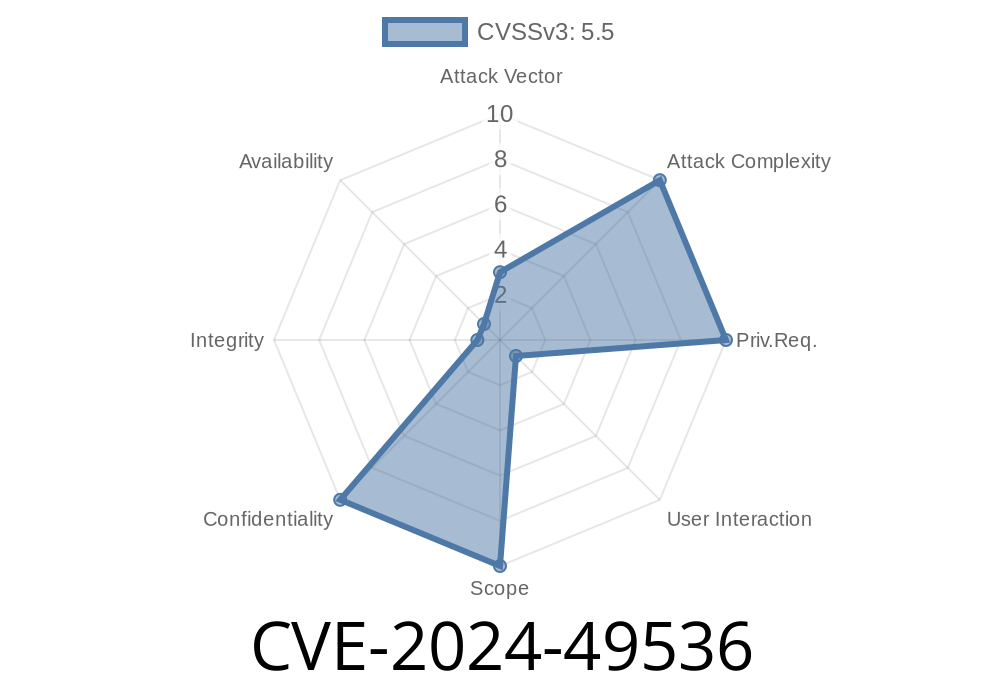Adobe Audition is a popular tool for video editors and sound engineers. However, a recently disclosed vulnerability, CVE-2024-49536, means some users could be at risk simply by opening what looks like a regular project file. Let’s break down what this bug actually does, how it could be used by a hacker, and go over details that can help you understand the risk.
What is CVE-2024-49536?
CVE-2024-49536 is an out-of-bounds read flaw found in Adobe Audition versions 23.6.9, 24.4.6, and earlier. When a victim opens a specially crafted malicious file in Audition, the program may read memory areas that it shouldn’t. This can lead to leakage of sensitive data from memory, such as stack canaries, memory layout information, or even passwords and cryptographic secrets.
Perhaps most concerning, leaking such info helps attackers bypass protections like Address Space Layout Randomization (ASLR), which is a defense against exploitation.
Reference
- Adobe Security Bulletin apsb24-34
- NVD Entry
How Does It Work? (Simplified Explanation)
Many vulnerabilities like this come from improper input validation. When Audition opens a file (like .sesx or .wav), it expects certain data in a specific format. If an attacker makes a file with data outside those “expected” bounds, the program does not properly check size or type before processing, and can follow a pointer or read an array beyond its limits.
Imagine this like reading past the last page of a book and into your desk drawer instead—whatever is stored there, Audition scoops up!
Victim opens file in Audition (user interaction required).
3. Audition reads beyond intended memory, revealing data such as memory addresses, potentially even private data.
Here’s a simplified C-style pseudocode of what could go wrong
// Vulnerable array/buffer handler in Audition’s file parser
char data[256];
// Attacker-controlled length read from file
unsigned int length = read_length_from_file(file);
// BAD: Does not check if length > 256
memcpy(data, file_content, length);
// If attacker sends length = 512,
// memcpy reads 256 bytes out-of-bounds from memory!
In reality, Adobe’s code is more complex, but the principle is similar: not checking boundaries results in leaks.
While sharing full weaponized exploits is unsafe, here is a high-level idea of exploitation
- Generate a malformed .sesx or .wav file where a field, such as “number of samples” or “chunk size”, is set much higher than the actual buffer size in the file.
- When Audition parses this, it reads “extra” memory at the end, which can be dumped or used to crash the app (triggering a read violation).
A hex editor can be used to tweak an existing Audition session file. For advanced users, Python can help:
with open('normalfile.sesx', 'rb') as f:
content = f.read()
# Overwrite the size field at the known offset with a huge value
malicious_content = content[:OFFSET] + b'\xff\xff\xff\xff' + content[OFFSET + 4:]
with open('malicious.sesx', 'wb') as f:
f.write(malicious_content)
Victim opens “malicious.sesx” in Audition — memory leakage ensues.
Why Is This Dangerous?
- Info leaks are powerful: Hackers use them to learn how your memory is arranged, defeat randomization (ASLR), or find other secrets.
- Attackers can chain vulnerabilities: Info leaks are often “Step 1” before more powerful attacks like arbitrary code execution.
- User must open the file: So, attacks are often via phishing or file sharing (“Hey, check out my new Audition project!”).
How to Protect Yourself
1. Update Audition: Adobe has fixed this in the latest versions. Don’t wait—Update here.
2. Don’t open files from strangers: Especially Audition project files from unknown or dubious sources!
3. Keep your OS and other apps up-to-date: Sometimes system-level protection (like DEP, ASLR) gets improved, too.
Conclusion
CVE-2024-49536 is a classic example of how a seemingly small bug—reading memory outside expected boundaries—can put users at risk. Even though it’s not a “remote code execution” bug by itself, info leaks can be the key ingredient for deeper attacks. Stay safe by keeping your software patched and being wary of suspicious files.
For further details, see the official Adobe advisory or the NVD listing.
Timeline
Published on: 11/15/2024 20:15:20 UTC
Last modified on: 11/19/2024 21:21:45 UTC
